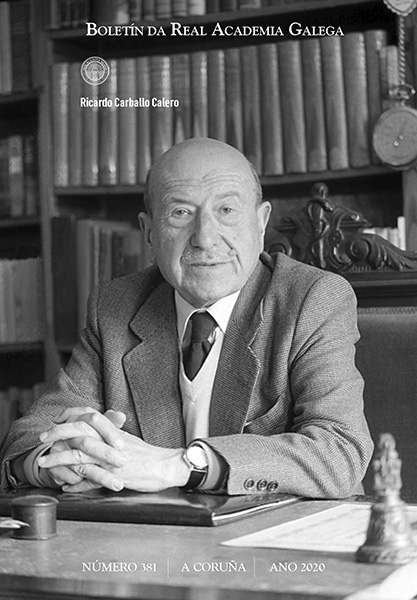O tratamento do xénero poético en Ricardo Carballo Calero. Crítica literaria, canon e historiografía
Publicado
Cómo citar
Número
Sección
DOI:
https://doi.org/10.32766/brag.381.788Palabras clave:
Ricardo Carballo Calero, poesía, crítica literaria, canon, historiografía, literatura nacional, nacionalismo literarioResumo
Nesta intervención, o obxectivo principal é a revisión da produción ensaística de Ricardo Carballo Calero centrada no xénero poético do século XX. Deste xeito, o eixe temporal que se vai abranguer transita dende os inicios na revista Nós até a presentación da súa magna obra Historia da literatura galega contemporánea, na edición definitiva de 1979. Asemade, cotexarase con diferentes calas representativas en textos do profesor e doutros axentes do campo. En concreto, este traballo pretende partir da produción deste autor para observar como se concibe e desenvolve a crítica no campo literario galego do século pasado.
Ao mesmo tempo, incidirase na proposta que realiza Carballo Calero dun canon poético para o século XX e mais a súa achega na construción dunha historiografía científica ligada ao nacionalismo literario incipiente. Desta maneira, acóutase unha obra que se considera determinante na hora de escoller uns habitus concretos na crítica e historiografía galega que se manteñen até os nosos días.
Descargas
Citas
Bourdieu, P. (1998). Les règles de l’art. Genèse et structure du champ littéraire. 5ª ed. Paris: Seuil.
Cadaval, F. (1949). Los problemas de la poesía gallega en 1949. La Noche. Suplemento del Sábado, 31/12/1949.
Cadaval, F. (1956). El poeta lírico, la víscera cordial y la tierra madre. La Noche, 26/VI/1956, 3.
Carballo Calero, R. (1931). Ollada encol da poesía lírica galega contemporánea. Nós. Boletín mensual da cultura galega, 87, 52-59.
Carballo Calero, R. (1932). Balance e inventario da nosa literatura. Nós. Boletín mensual da cultura galega, 108, 222-223.
Carballo Calero, R. (1934). A xeneración de Risco. Nós. Boletín mensual da cultura galega, 131-132, 182-184.
Carballo Calero, R. (1955). Sete poetas galegos. Vigo: Galaxia.
Carballo Calero, R. (1974). Figuras representativas da literatura galega actual. Grial, 45, 269-279.
Carballo Calero, R. (1981). Historia da literatura galega contemporánea 1808-1936. 3ª ed. Vigo: Galaxia.
Casas, A. M. (1928). La nueva literatura gallega. La Gaceta Literaria, 37, 6; 38, 6.
Casas, A. M. (1930a). ¿Qué es la vanguardia? La Zarpa, 2796 (7/VIII/1930), 1.
Casas, A. M. (1930b). La novísima poesía gallega. La Zarpa, 2805 (17/VIII/1930), 6-7.
Casas, A. M. (1935). Esquema da nova poesía galega. Nós. Boletín mensual da cultura galega, 139-144, 115-124.
Consello da Cultura Galega (2020). Ricardo Carballo Calero con Otero Pedrayo [epistolario, 2021].
Fernández de la Vega, C. (1985). O segredo do humor. Vigo: Galaxia.
Fernández del Riego, F. (1933). Índice cultural e artístico do Renacemento galego. Nós. Boletín mensual da cultura galega, 117, 184-188; 118, 224-228; 119, 241-243.
Fernández del Riego, F. (1996). A xeración Galaxia. Vigo: Galaxia.
Fernández del Riego, F. (2000). Un epistolario de Ramón Piñeiro. Vigo: Galaxia.
Fernán-Vello, M. A. e Pillado, F. (1986). Conversas en Compostela con Carballo Calero. Barcelona: Sotelo Blanco.
Figueroa, A. (2001). Nación, literatura, identidade. Vigo: Edicións Xerais de Galicia.
Figueroa, A. (2010). Ideoloxía e autonomía no campo literario galego. Santiago de Compostela: Laiovento.
Figueroa, A. (2015). Marxes e centros. Para unha socioloxía do campo cultural. Santiago de Compostela: Laiovento.
Franco Grande, X. L. (2004). Os anos escuros. A resistencia cultural dunha xeración. Vigo: Galaxia.
González-Millán, X. (1994). Do nacionalismo literario a unha literatura nacional. Hipótese de traballo para un estudio institucional da literatura galega. Anuario de Estudios Literarios Galegos, 1994, 67-81.
González-Millán, X. (1998). O criterio filolóxico e a configuración dunha literatura nacional: achegas a un novo marco de reflexión. Cadernos da lingua, 17, 5-24.
González-Millán, X. (2000). Resistencia cultural e diferencia histórica, a experiencia da subalternidade. Santiago de Compostela: Sotelo Blanco.
Otero Pedrayo, R. (1982). Ensaio Histórico sobre a Cultura Galega. Vigo: Galaxia.
Máiz Suárez, R. (1997). A idea de nación. Vigo: Edicións Xerais de Galicia.
Piñeiro, R. (2002). Da miña acordanza: memorias. Vigo: Galaxia.
Piñeiro, R. (2004). Cartas de Ramón Piñeiro a Ricardo Carballo Calero. Cadernos Ramón Piñeiro V. Santiago de Compostela: Centro Ramón Piñeiro para a Investigación en Humanidades. Edición de: L. Alonso Girgado, M. Cuquejo Enríquez e C. Fariña Miranda.
Risco, V. (1933). Nós, os inadaptados. Nós. Boletín mensual da cultura galega, 115, 115-123.
Risco, V. (1952). Historia de Galicia. Vigo: Galaxia.
Silva, V. M. de Aguiar e (1993). Teoría da literatura. Coimbra: Livraria Almedina.
Valverde, A. (2020). Carballo Calero e a Historia da literatura. Grial, 227, 82-89.
Williams, R. (1974). The country and the city. New York: Oxford University Press.











